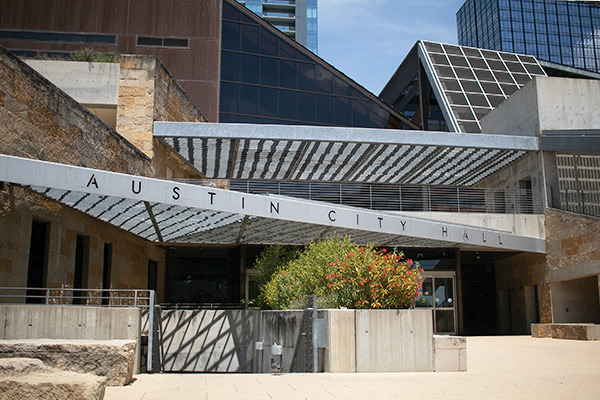Hundreds of entrepreneurs and investors listened intently Friday as Dan Street, founder of a company that attempts to connect people with their neighborhood, showed off his new spin on social connections and technology in the AT&T Executive Education and Conference Centers amphitheater.
Streets company, Borrowed Sugar, could serve Austins 1,200 neighborhoods by posting on a website local events, news articles, restaurant information, deals with area businesses and a forum for communication. Borrowed Sugar can find anything happening online that is relevant to a particular neighborhood, Street said.
When you move into a new house, you can feel connected to your neighbors and connected to your community, he said.
Borrowed Sugar was one of several UT-originated business ventures on display at Fridays inaugural Texas Venture Lab Expo, which also featured talks from UT President William Powers Jr. and other University leaders about the state of entrepreneurship at UT.
For years, UT has struggled to keep up with other large public research universities in technology commercialization revenue, according to data compiled by the Chronicle of Higher Education. Though its intellectual property revenue has risen steadily since 2003, and UT spent $640 million on research in fiscal year 2010, the University accumulated only about $14 million in revenue this fiscal year. In 2010, UT received the second highest amount of research dollars in terms for public universities without a medical school, but competing universities among that group outperformed UT with fewer research dollars.
Greg Fenves, dean of the Cockrell School of Engineering, said technology commercialization is crucial to the distribution of knowledge. While research journals will always be an important medium to transfer knowledge to the public, some innovations must make a splash in the market, he said. UT has a responsibility to identify those innovations and commercialize them, Fenves said.
That is an important way that we pay back society for the large investment that they make in public higher education here in Texas, he said. This is something that UT needs to do a better job of.
Taking up the challenge to reform the way UTs Office of Technology Commercialization, Richard Miller, UTs chief commercialization officer, said he was attracted to UT for its wealth of research. He said he felt that universities must be aggressive about changing the way they commercialize technology because it will be of paramount importance to the country.
In terms of process, were really good. But when you look at the output of all those patents filed, and all those licensing agreements and all those start ups, we actually dont have that much to show for it, Miller said. Thats because were not thinking about it right.
Miller said the patent for UTs most successful technology a glucose monitor developed by former UT researcher Adam Howard expires in 2014. A larger company acquired Howards company, Therasense, for $1.4 billion in 2004. The royalties UT receives from that deal make up more than 40 percent of the Universitys technology revenue this year about $6 million of a total $14 million.
UT should become more selective in choosing which technologies to pursue patents for, Miller said. In fiscal year 2010, the OTC filed 300 patents, had 50 licensing agreements, 32 start-ups, but only one company raised more than $1 million.
Powers said UTs bureaucratic nature creates a challenge for businesses and the University to work together, but that UT must get hooked into the flow of the emerging wealth-creating force in the country technology and venture capital.
I think the real challenge is that universities are going to have to become more in-tune with social and wealth-creating forces, Powers said.











